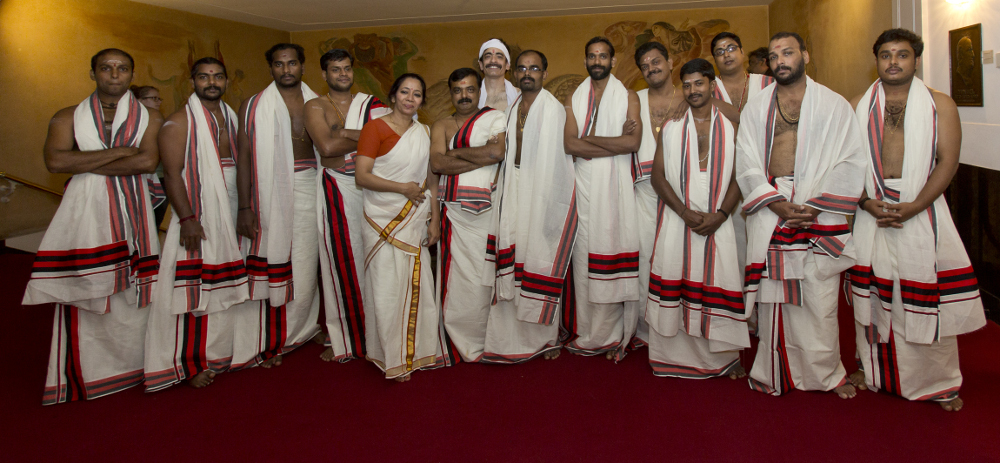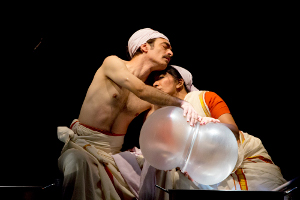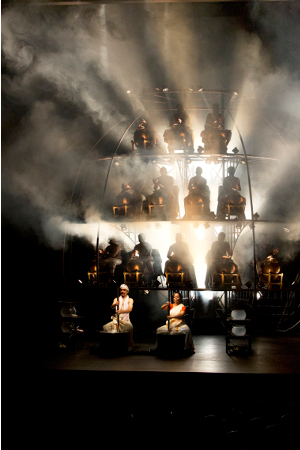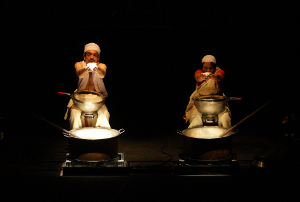
“Its that sort of theatre that takes you back home than further away from it”
The Hindu

The Kitchen is an attempt to understand cooking as a metaphor for Life itself. This is done with a ritual fusion of sight, sound, smell, taste and emotion, in search of the perfect balance. On stage a drama without words unfolds between a husband and wife who are preparing a payasam, a traditional Indian dessert, in large pots along with twelve drummers, who are slowly revealed, playing the mizhavu, a traditional barrel-shaped drum from the South-Indian region of Kerala. The surging sounds from the drums which explore the process of cooking sonically, the design that explores the process of cooking visually on stage and the spreading fragrances of the food combine as in a trance inducing meditation to reach a boiling point delighting all the senses, including taste, as the audience is invited to share the payasam afterwards.

The Kitchen began to simmer in me four years ago when I visited Jalaludin Rumi’s tomb in Konya (Turkey). When I walked into his kitchen I saw a raised platform, which was the area in which Mewlana Rumi sat with his followers to meditate and pray. Below this raised area on the right were two large vessels in which the food was cooked for all the people in the hall. On the left of the vessels, close to the entrance were two pairs of shoes, which caught my interest. On asking about the significance of the shoes, I was told that it was the area for the novices. When they came to join Mewlana Rumi they were first asked to remain on their knees in meditation without food or water in the midst of all this action of cooking, dancing and meditating for days together. If they survived the test they would be allowed to join in.
What fascinated me here was that in Rumi’s Kitchen cooking was happening in various planes. First there was the literal act of cooking where food was getting cooked for all the bodies present there, second there was the cooking of the self that was happening with the novices and also the Sufis cooking the cosmic vessel.
Cooking is a very strong image in Rumi’s poems and one of the poems that really caught my attention was the conversation between chic pea that jumps out of the boiling pot and the cook. In this theatre experience we have tried to explore these various plains of cooking to understand and experience the holistic concept of cooking as a metaphor for the evolution of the soul.It did take me a while to gather the ingredients for this Kitchen before I could start to cook. Once I found the ingredients, I needed to find the resources to procure them and this is where The Sydney festival, Auckland festival and the Holland Festival came in as Co Producers.
“Breaking the conventional norms of the theatre, Roysten Abel’s The Kitchen became the perfect cocktail, tingling the five senses of the viewers
The New Indian Express

Mizhav or mizhavu one of the oldest percussion instruments is an integral part of the performing temple arts of Kerala like Koothu, Koottiyattam and Nangiar Koothu.A large pot-shaped vessel made of copper or clay with the mouth covered with stretched hide, this instrument is unique in producing a vibrant tone enriched with classical rhythm and purity. Considered as a 'Brahmachari' (a Sanskrit word meaning one who observes the vow of brahmacharya), this sacred instrument was allowed to be played only by a person from the Ambalavasi Nambiar Community, Chakkiyar and the Nangiars. It used to be a central part of all the solemn ceremonies like 'Annaprasanam' (first feeding of the baby), 'Namakaranam' (Naming ceremony), and other customary Hindu rites.
The Mizhavu also has rights like the Brahmins. Hence all rituals including the Upanayanam (sacred thread ceremony) and cremation of the dead, that are a part of the Brahmin culture are given to Mizhavu too. The Upanayanam ritual is practiced to introduce male children into their formal education.There is a traditional decree that if the 'Mizhavu' became dented or damaged after some period then some solemn rites had to be observed. Repair and reusing this sacred instrument is not allowed. In the olden days mizhavu was made out of clay, but these days it is mostly made of copper. It's narrow mouth is covered tightly with leather. It is usually placed inside a wooden frame called 'mizhavana
The Cooks
The Mizhav Players
| Festival | Place | Date |
| ITFOK | Kerala | JANUARY 2014 |
| LES NUITS DE FOURVIERE | LYON FRANCE | JUNE 2014 |
| HOLLAND FESTIVAL | AMSTERDAM | JUNE 2014 |
| GEORGE TOWN FESTIVAL | AMSTERDAM | AUGUST 2014 |
| NEW VISION ARTS FESTIVAL | HONGKONG | OCTOBER 2014 |
“Roysten Abel is known for his thrilling, grand-scale stage productions.The Kitchen is no exception; it promises to stimulate the audience's four senses - sight, sound, smell and taste - all at once.
South China Morning Post